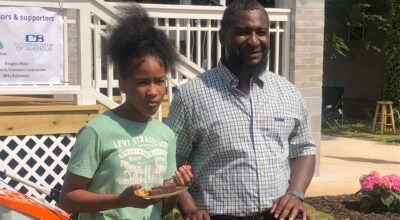Georgia 4-H celebrates National 4-H Week Oct. 2-8
Published 11:00 am Friday, October 7, 2016
AMERICUS — Georgia 4-H’s 172,354 student members are celebratin National 4-H Week Oct. 2-8. During the week, the state’s largest youth development organization wants to raise awareness of the program that started as a club for farm kids and has grown into a place that helps youth become successful and confident adults.
It’s true that 44 percent of Georgia 4-H members live in rural areas, but just 3 percent live on a farm.
Fifty-three percent say they live in the city, in a small town or in another urban or suburban setting.
Georgia 4-H is available to children in all of Georgia’s 159 counties. In Sumter County, over 400 students in fourth through 12th grades participate in 4-H. Local University of Georgia Cooperative
Extension 4-H Agent, Crystal Perry and AmeriCorps Community Service Specialist, Karnisha Mercer, lead the 4-H program in Sumter County.
The four ‘H’s stand for head, heart, hands and health and are represented by the four-leaf clover.
Participating youths develop life skills through hands-on projects involving volunteer work, health, science, engineering, technology, leadership, agriculture and communication.
Georgia 4-H under the umbrella of UGA Extension, and 4-H programs are based on research from the UGA College of Agricultural and Environmental Sciences and other UGA colleges. Georgia 4-H agents supplement teachers’ efforts by using after-school lessons and in-school curricula designed to meet Georgia Performance Standards.
Georgia 4-H has always had roots in science, in recent years that emphasis has shifted slightly to include other closely-related disciplines, known as STEM (science, technology, engineering and mathematics).
The more strategic inclusion of engineering and technology programs has been a natural fit as Georgia 4-H’s slogan is “Learn by Doing.” STEM subjects are presented to 4-H members through new projects at 4-H Project Achievement, new in-school club meeting curriculum and new activities like Mission Make-It: Georgia 4-H Engineering Challenge new STEM 4-H Ambassadors and robotics competitions.
“The idea of bringing UGA research and resources to Georgia students through the use of county agents throughout the state was a cutting-edge idea in 1904, and remains so even today,” said Arch Smith, state 4-H leader. “The most important work of 4-H is to help young people become better citizens and enable them to grow into responsible, active adults.”
When asked, “attending 4-H camp and making lifelong friends” continues to top of the list of Georgia 4-H members’ favorite things about being in 4-H. High school age Georgia 4-H youths say their 4-H experience provided them with opportunities to travel, learn leadership skills, give back to their communities and overcome their fears of public speaking.
Each year, over 30,000 Georgia 4-H youth perform community service, conduct research, compile portfolios of their accomplishments and learn public speaking skills through oral presentations at 4-H District Project Achievement.
Students also learn responsibility through livestock projects, programs and judging. Georgia 4-H partners with Georgia FFA and the UGA Department of Animal and Dairy Science to provide these programs. Every year, close to 2,500 students complete a year-long process to prepare more than 4,500 animals for exhibition at the Georgia Junior National Livestock Show and other competitions.
According to Tufts University study, 4-H members are:
• Two times more likely to contribute to their communities than youths not in 4-H
• Three times more physically active than youths not in 4-H
• Five times more likely to graduate from college than youths not in 4-H
• Two times more likely to pursue a career in science than youths not in 4-H
The structured learning, encouragement and adult mentoring that young people receive through 4-H play a vital role in helping them actively contribute to their communities, according to the study.
To learn more about Georgia 4-H, go to georgia4h.org. To find out more about Georgia 4-H in your county, contact your local UGA Extension office.
— Submitted by Sharon Dowdy, University of Georgia




